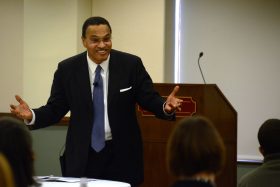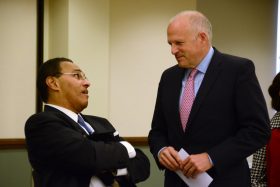Named by Time as one of “The 100 Most Influential People in the World,” UMBC President Freeman Hrabowksi shared reflections on college, race & the liberal arts.

Freeman Hrabowski III, president of the University of Maryland, Baltimore County, challenged his audience in the Lakeside Meeting Room to rethink the way college students are taught. He encouraged professors and staff to foster interactions between students of different backgrounds by teaming them together on assignments to solve larger community problems.
With multiple research projects and publications focused on science and math education, which include special emphasis on minority participation and performance, Hrabwoski over the past two decades has thrust his university onto the national stage for the advancements it has made in attracting women and minorities into fields such as technology and engineering.
However, he said, the liberal arts remain a key component to student success in any discipline, and he praised Elon for its commitment to academic rigor. He also posed a rhetorical question for his audience to consider.
“What is it about Elon that takes into account the fact that its students will spend the rest of their lives in a century in which the name of the game is change, constant change, and how will this liberal education, this liberal arts core, prepare them for that world?” Hrabowski said. “This is an institution that has what I think is an intimate setting in which you can learn more about students, to see what they like and don’t like, what they’re learning and need to learn, and most importantly, what they think about their future.
“The question that I really want you to think about … is how different are your students when they graduate from who they were when they first come in? We may know they have some skills and have learned something from their disciplines. But does this education push them to examine everything they’ve learned?”
Much of Hrabowski’s discussion, including his answers from audience questions toward the end of the event, centered on the need for students of all backgrounds to be represented in all fields. Diverse backgrounds and experiences allow for robust examinations of problems, and they instill stronger visions and ideas for improving the world.

Hrabowski chaired the National Academies’ committee that produced the 2011 report, Expanding Underrepresented Minority Participation: America’s Science and Technology Talent at the Crossroads. He also was named by President Barack Obama to chair the President’s Advisory Commission on Educational Excellence for African Americans, and in 2012, Time named him one of “The 100 Most Influential People in the World.”
“Just a simple search on Google or any search engine would just spew an impressive list of accomplishments for Dr. Freeman Hrabowski III,” Associate Professor Prudence Layne, director of the African and African American Studies program, said when she introduced Hrabowski to the room. “It’s his first (visit to Elon) and I hope it won’t be his last.”


